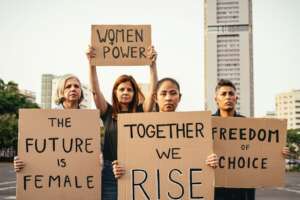The Hirak movement, initially sparked by socio-economic issues, has taken a significant turn towards feminism, which was particularly evident on March 8, International Women’s Day. Women are now active in protests across Morocco, from Hoceima to Casablanca, as well as among the Moroccan diaspora in European cities such as Brussels and Amsterdam. The participation of Amazigh women in this movement signals the birth of a new wave of feminism as part of Morocco’s broader struggle for justice and democracy.
Origins of the Hirak Movement
The Hirak movement began in the Rif region of northern Morocco following the tragic death of fish seller Mohsin Fikri on October 28, 2016. Fikri’s death, caused by a garbage truck compactor while he tried to retrieve confiscated goods, sparked widespread outrage and protests against systemic injustice and police brutality. The initial demands for justice for Fikri evolved into broader calls for social and economic reforms, including the release of political prisoners, construction of hospitals, and creation of jobs.
Women Leading the Charge
Key female figures have played pivotal roles in the Hirak movement, especially following the arrests of prominent male leaders. Activists like Nawel Benaissa and Silya Ziani have stepped up to continue mobilizing support and organizing protests. Their leadership has been crucial in maintaining the momentum of the movement and highlighting the specific challenges faced by women in the region.
Key Figures in Hirak:
- Nawel Benaissa: A leading female activist in the movement.
- Silya Ziani: Another prominent female figure who has taken a stand in organizing and leading protests.
Historical Context and Challenges
The Rif region has historically faced neglect and repression, first under Spanish colonial rule and later from the Moroccan monarchy. This has resulted in deep-seated socio-economic issues, with the region being militarized and underdeveloped. Women in the Rif have borne the brunt of these hardships, facing illiteracy, unemployment, and lack of access to education and healthcare.
The active participation of women in Hirak has been a significant step forward. This involvement has not only brought gender-specific issues to the forefront but also strengthened the overall movement. Women have demanded access to basic services like healthcare and education, and their presence has been crucial in the call for demilitarization of the region.
Moving Forward
The Hirak movement continues to face serious challenges, including increased repression and violence by Moroccan authorities. However, the persistent participation of women and support from the international community provide hope for further progress. As the movement evolves, it is essential for all stakeholders to support the movement for justice, democracy, and gender equality in Morocco.
The feminist turn in the Hirak movement has not only strengthened the struggle for social and economic reform, but has also laid the groundwork for a more inclusive and equitable future for all Moroccans.
